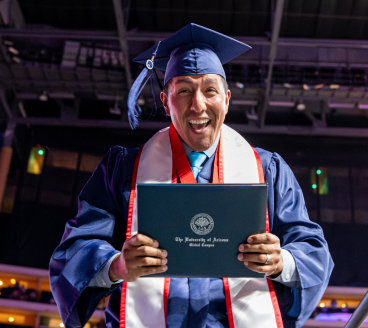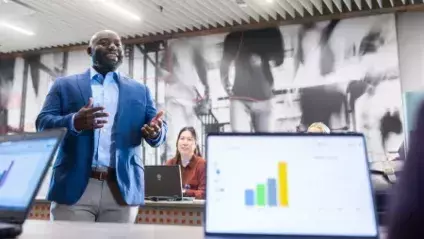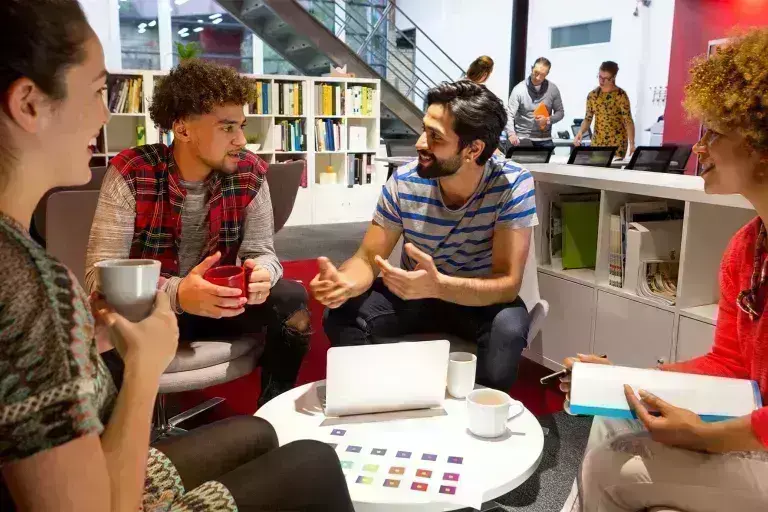Questions? Request Information
Make a Positive Impact on Society
See the world through the lens of different cultures and communities when you earn a Bachelor of Arts in Sociology from the University of Arizona Global Campus (UAGC). As a sociology major, you will study social theory and social structures, research methods, and social policy while exploring a variety of concepts, including social responsibility, diversity, and human rights to gain a better understanding of the structure of groups, organizations, and societies.
In the online sociology degree program, you’ll study the diversity of society, the cause of social issues, how to provide solutions, and how advocates influence positive social change in communities and through social policy. Upon completion of your degree in sociology, you will be able to:
- Defend diversity, social responsibility, human rights, dignity, and respect for others
- Apply sociological theory into action
- Utilize the sociological perspective on social, cultural, legal, and political issues
- Critically evaluate human behavior within a social justice framework
- Analyze social scientific methods and data applied to social justice frameworks
- Interpret how law and policy impact lived experiences, promoting public understanding
Military Students $250.00/credit
Undergraduate Courses $460.00/credit
Technology Fee** $115.00/course
Books and Other Class Materials** $125.00/average per course
Graduation Fee $150.00
Total Program Cost See UAGC Catalog¹
¹Keep in mind that this figure doesn’t factor in any potential discounts, partner benefits, or impact of accepted transfer credits, if eligible.

UAGC offers enrolled students access to ScholarshipUniverse, a platform that tailors external scholarship opportunities to your unique situation, making it easier to find and apply for scholarships.
UAGC is proud to provide reduced tuition rates for our academic and corporate partners, helping community college transfer students and corporate employees earn their degrees at a lower cost.


Sociology Degree Curriculum Overview
Engage in the study of humans in their collective aspects in society as well as their membership in identity groups and social class. Tackle such areas as social issues, identity group experiences, social inequality, discrimination, community, and aging. Learn how to statistically measure and analyze sociological research data to further understand the experiences of humans in social contexts. By taking such a variety of courses, you will be exposed to learning opportunities that will help you develop a proficiency in written communication, research methods, information analysis, evidence-based decision, and policy making.
To earn your Bachelor of Arts in Sociology at the University of Arizona Global Campus, you must complete 120 credits. You will need to complete 30 upper-division credits, of which 18 credits must be from the major program. A total of 30 credits must be completed at the University of Arizona Global Campus to meet the residency requirement. You may be able to transfer approved credits from community colleges, other previous college coursework, or other life experiences such as military service or job training toward your degree.
This program is not designed to meet the state educational requirements for a specific professional license or certification in any state. Students seeking licensure or certification in a particular profession shall carefully research the requirements prior to enrollment and regularly review the requirements as they are subject to change. Requirements vary by state. The University of Arizona Global Campus does not guarantee that any professional organization will accept a graduate’s application to sit for any exam for the purpose of professional certification. Further, a criminal record may prevent an applicant from obtaining licensure, certification, or employment in their field of study.
Certain degree programs may not be available in all states.
The Online Teaching Support Certification recognizes programs that require all online faculty to undergo training in best practices for online course delivery, provide faculty with ongoing pedagogical support, encourage faculty professional development to increase their knowledge and skill in online teaching, emphasize instructor availability and feedback to learners, and collect and use feedback from learners to improve online teaching. Learn More

The Online Learner Support Certification recognizes programs that provide all the critical student and academic services needed for learner success and use learner feedback to continuously improve those services.

What Can I Do with a Degree in Sociology?
With a BA in Sociology, you may consider pursuing a career in any of the following areas in which the concepts of sociology can be applied:
- Social Science Research Assistants
- Social and Human Service Assistants
- Community Health Workers
- Federal, State, and Local Government
- Colleges and Universities
- Corporations
- Non-Profit and Public Organizations
When you complete your bachelor’s degree in sociology, there are many fields you could consider, including social research or analysis, human and social services, government, workplace and community advocacy, activism, and more.
Gain insights into the sociology job market by reviewing the Bureau of Labor Statistics market outlook report.
This degree was perfect for me. The advisors were so very helpful, and the classes were very informative. I definitely got my money's worth.
BA in Sociology FAQs
-
Choosing an online degree program can sometimes be an overwhelming journey, as there are a variety of different factors to take into consideration. A bachelor’s degree in sociology is a multifaceted subject area that can prepare you with transferable and marketable skills that can benefit you across many different industries. More importantly though, studying sociology can provide you with a better understanding of society in all its diversity, such as:
- The unique experiences of identity groups and social inequality in society
- The way social change can specifically impact identity groups and collective society
- How social structures, policies, and institutions impact the experiences of humans in society
- How sociologists use research to understand social issues and influence policies related to society
-
In the BA in Sociology program at UAGC, you will explore the social behavior of varying groups, cultures, organizations, and social institutions while seeking to gain an understanding of why people think, feel, and behave the way they do. In your courses, you’ll engage with social issues, identity group experiences, social inequality, discrimination, community, and aging. You’ll also learn how to statistically measure and analyze sociological research data to further understand the experiences of humans in social contexts.
-
A BA in Sociology provides a deep understanding of social structures, human behavior, and societal issues. This knowledge is valuable in a wide range of fields, from social services and education to business and government, as it equips individuals with critical thinking skills and insights into how societies function.
-
Earning your sociology degree online at UAGC gives you the ability to continue with your current responsibilities while attending college at the same time. By taking one online class at a time, you can focus on one subject at a time, on your schedule, so you can complete your coursework more efficiently.
The faculty members in this online sociology degree program have advanced degrees, and many have relevant professional expertise. By combining advanced degrees with real-world experiences, the sociology faculty members can enrich your learning environment with information and knowledge that can be related to your professional career.
See What Else UAGC Has to Offer
Questions? Request More Information
To access this rate using the Liberty Grant, only eligible undergraduate active duty service members, members of the National Guard, Reservists, spouses of active duty, members of the National Guard and Reservists, Department of Defense employees using Tuition Assistance (TA), and civilian employees of the United States Coast Guard (only if utilizing Military Tuition Assistance) will qualify.
**
The Technology Fee covers access to University systems such as the online classroom, the Student Portal, and other academic resources. The Technology Fee and the Course Digital Materials (CDM) Fee are fully refundable if a student does not attend beyond Day 3 of a course (Week 3 if covered under the University of Arizona Global Campus Promise Refund Schedule). After this time, the fee becomes non-refundable. Students are charged the Technology Fee for repeated coursework. Students are not charged the CDM fee for repeated coursework if previously charged.
†
The transferability of credits is subject to the University of Arizona Global Campus transfer credit policies and requires the submission of official transcripts. The official transcripts will be evaluated by the Registrar’s Office to determine the credits that will officially apply toward a UAGC degree program. Credits must be earned at the same degree level in order to be applied. Additional restrictions may apply. See the UAGC Academic Catalog for full undergraduate and graduate transfer policies.




